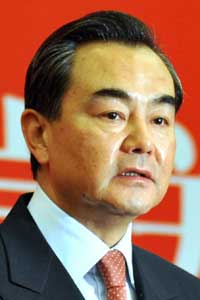Taiwan
Chinese united by cultural ties
By Zhao Yinan (China Daily)
Updated: 2011-01-19 08:04
 |
Large Medium Small |
Traditional heritage has role to play in developing cross-Straits relations
 |
|
Wang Yi is minister of the Taiwan Affairs Office of the State Council. |
GUILIN, Guangxi - Beijing's top Taiwan affairs official has called on both sides of the Straits to jointly promote traditional Chinese culture in the latest effort to boost ties, which have become characterized by booming economic cooperation.
Wang Yi, minister of the Taiwan Affairs Office of the State Council, said on Tuesday the mainland and Taiwan should seize the opportunity to set up a systematic mechanism for cultural and educational exchanges.
"It is time to strengthen the heartfelt link between people on both sides by enhancing cultural exchanges after previously achieving direct links in trade, mail and transport services," he said at the opening ceremony of the 9th Seminar on Cross-Straits Relations.
The two-day event, which opened on Tuesday in Guilin in the Guangxi Zhuang autonomous region of South China, focused on the essence of traditional Chinese culture and its role in the peaceful development of cross-Straits ties.
It attracted more than 120 experts and scholars from the mainland, Taiwan, Hong Kong, Macao and countries overseas.
The call for more cultural exchanges follows Beijing and Taipei taking their economic cooperation to a new level by signing the landmark Economic Cooperation Framework Agreement, which took effect in last September.
Taiwan leader Ma Ying-jeou has been pushing for stronger economic ties with the mainland since he took office in May 2008, opening the island to mainland tourists.
From January to November 2010, cross-Straits trade volume reached $131.7 billion, a year-on-year increase of 39.7 percent.
The mainland has become the largest source of tourists for Taiwan, with 1.23 million mainland tourists visiting the island last year, a 127.8 percent increase on the preceding year, the island's tourist authority announced on Tuesday.
Wang said promoting traditional Chinese culture, a "treasure" shared on both sides of the Straits, will power the development of relations.
He expressed the hope that people on both sides will jointly respect and continue to follow the traditions of Chinese culture, trying to understand their historical and realistic values.
He also called on cross-Straits cultural circles to make more effort to spread Chinese culture throughout the world and accelerate the progress of cross-Straits communications in the fields of culture and education.
Echoing Wang's remarks, Liu Chao-shiuan, head of the Taipei-based Chinese Culture Association and also former "premier" of the island, called for "a renaissance of Chinese culture", saying the shared culture is the bond that unites Chinese people everywhere.
Liu said cross-Straits communications have increased since 2008, creating new opportunities for both sides to expand cooperation from the economic sector to the cultural field.
Liu highlighted the application of wangdao - or the Confucian ideology of benevolent government - in solving problems facing the two sides.
"To address cross-Straits relations with wangdao means more sincerity from both sides," he said.
Minister of Culture Cai Wu also urged the two sides to hold "extensive talks" and create "favorable conditions" for a cultural exchange pact during his visit to Taiwan last September.
As a first step toward promoting educational exchanges, approximately 2,000 students are expected to pursue higher education degrees at Taiwan-based universities starting in September, according to the island's education authorities.
Xinhua contributed to this story.
| 分享按钮 |



